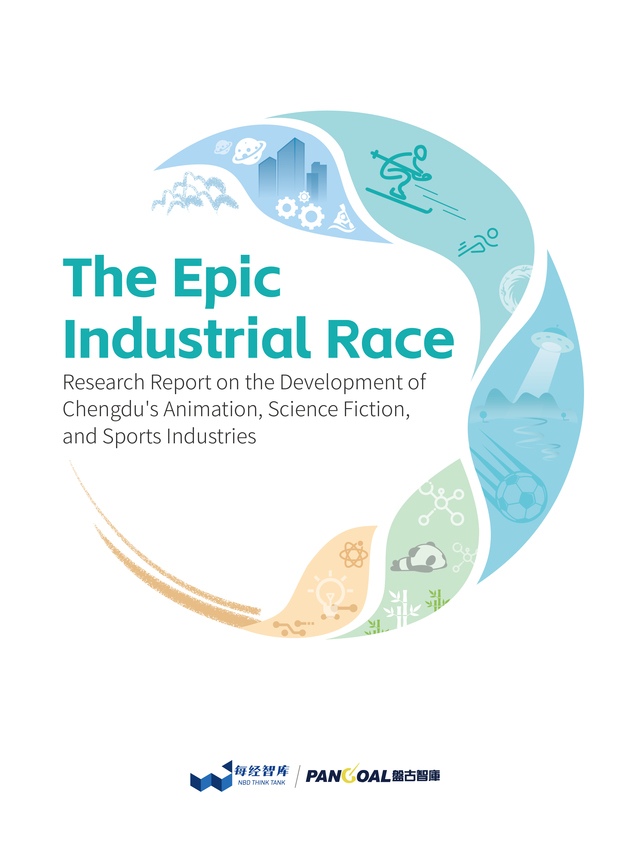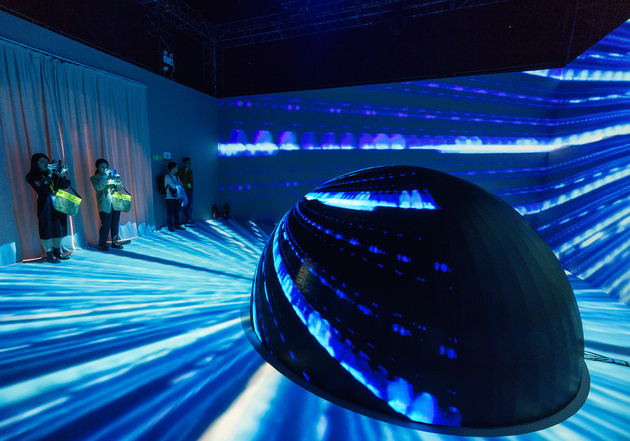On July 24, 2025, the Epic Industrial Race: Research Report on the Development of Chengdu's Animation, Science Fiction, and Sports Industries (hereinafter referred to as the Report), jointly produced by NBD Think Tank and Pangoal Institution, was officially released online to the world.
The Report systematically reviews the strong development momentum, unique development advantages, and future development pathways of Chengdu, as an important economic and cultural center in western China, across three key industries—animation, science fiction, and sports—which are core components of the digital cultural and creative sector.
The Report highlights that the three industries, leveraging Chengdu's solid economic foundation, abundant talent reserve, and strong policy support system, are forming clusters worth over RMB 100 billion, accelerating their ascent to the higher end of the global value chain.

Animation Industry: High Concentration of Enterprises and Talent Supports the Development of Chinese Animation
In 2024, Chengdu's GDP reached RMB 2,351.13 billion, ranking seventh nationwide, with the service sector contributing over 70%, providing a robust foundation for the development of cultural and creative industries. The relatively low cost of living and the livable environment continue to attract a large number of creative talents to the city, forming a vibrant creative community.
Universities in Sichuan Province, such as Sichuan University and the University of Electronic Science and Technology of China, produce over 15,000 graduates in relevant fields annually, ensuring a steady supply of talent.
Additionally, the Digital Cultural and Creative Talent Program, launched in 2025, aims to introduce 1,000 high-end professionals in cutting-edge fields such as game engine development and AI-powered animation generation to fortify the core engine of industrial innovation.
Chengdu's animation industry has now surpassed RMB 100 billion in scale, gathering over 37,000 enterprises: The phenomenal Chinese animated film "Ne Zha 2: The Sea's Fury" has achieved a global box office exceeding RMB 15.9 billion, topping the global animated film charts as the industry's flagship achievement; leading enterprises such as Tencent's TiMi Studio Group and L2 Studio, along with more than 60 upstream and downstream enterprises in the industrial chain, have converged in Tianfu Long Island Digital Cultural and Creative Park, creating significant cluster effects.
Moreover, Chengdu has the largest animation complex in southwest China—Tianfu International ACG City—spanning over 120,000 square meters. This complex integrates diverse business formats and hosts over 200 comic conventions annually, creating a vibrant industrial and consumption atmosphere and standing as another new landmark of the animation industry.
Science Fiction Industry: Policy Innovation Gives Rise to Science Fiction Capital

Immersive exhibition featuring "The Three-Body Problem"
File photo/Zhang Jian (NBD)
Chengdu's science fiction industry has grown rapidly in recent years: In 2023, it recorded RMB 23.521 billion in total revenue, a year-on-year increase of 17.49%, solidifying Chengdu's position among China's top cities for science fiction development; in 2024, the total revenue exceeded RMB 28 billion, up about 20% year-on-year, sustaining Chengdu's leading position in the national science fiction industry.
In 2024, the total R&D investment of Chengdu's science fiction industry (covering games, film and television, technology applications, and other fields) reached approximately RMB 3.5 billion to RMB 4 billion, accounting for 12%–14% of the industry's total revenue, which was slightly higher than the national average level in cultural and creative industries.
This year, Chengdu achieved national breakthroughs in the science fiction field by releasing the first batch of city-level science fiction support policies, the "13 Science Fiction Initiatives," and establishing the "Chengdu Science Fiction and Future Industry Development Fund" with a target scale exceeding RMB 3 billion.
In talent development, Chengdu pioneers an innovative university-research collaboration model, with Sichuan University launching the "Chenyue Science Fiction Cultural and Creative Alumni Scholarship", the first of its kind in China, and initiating the Southwest Science Fiction Alliance, which aims to converge forces from science fiction clubs in the universities in southwest China to cultivate creative talent.
For IP operations and culture-tourism integration, Chengdu introduced the world's first "The Three-Body Problem" offline experience space, the Three-Body Four-Dimensional Space, which integrates VR interactions, spin-off merchandise, and themed dining. The project also collaborates with scenic spots such as the Dujiangyan Irrigation System and the Wuhou Shrine, offering immersive experience routes that integrate science fiction and cultural tourism.
Sports Industry: Robust Event Economy Drives Vibrant Park City Development

File photo/Zhang Jian (NBD)
In 2024, the total scale of Chengdu's sports industry exceeded RMB 130 billion, with sports consumption exceeding RMB 75 billion, marking a year-on-year increase of approximately 13%. The event economy served as a powerful engine.
More than 70 international and domestic events were held throughout the year, among which: the BWF Thomas & Uber Cup Finals generated over RMB 50 million in ticket revenue, with the direct economic benefit reaching RMB 540 million; the League of Legends Mid-Season Invitational generated over RMB 150 million in direct consumption; the ITTF Mixed Team World Cup 2024 generated RMB 45 million in ticket revenue and contributed RMB 380 million to service consumption, with 70% of the spectators coming from outside Chengdu; and the Chinese Football Super League (CSL) Chengdu home matches averaged 40,000 spectators per game, marking the highest CSL attendance and generating RMB 78 million in ticket revenue.
Chengdu's sports industry uniquely integrates regional characteristics with technological innovation. Leveraging natural resources such as the Longmen Mountains and the Longquan Mountains, the city has developed characteristic sports options such as Hongkou rafting, Zhaogong Mountain hiking, Longquan Mountains cycling, and Xiling Snow Mountain skiing. Major sports venues also incorporate cutting-edge technologies.
For example, the Wuliangye Culture & Sport Center can realize the rapid conversion between basketball and ice hockey courts within the same arena, while its ETFE roof significantly enhances spectator experiences. Furthermore, Chengdu is building itself into a city of table tennis, badminton, and tennis, a city of art and sports, a city of chess, a capital of cycling and running, a capital of e-sports culture, and a "gold medal" football city, comprehensively promoting event hosting, urban development, business growth, and public well-being.
The Report emphasizes that the three industries have formed a synergistic "golden triangle" across policy, talent, and internationalization dimensions. Chengdu's leading policy framework, abundant talent reserve, and accelerating global promotion further underpin its high-quality development. It is estimated that by 2027, the added value of culture and related industries, the total tourism expenditure, and the total scale of the sports industry will reach about RMB 200 billion, RMB 470 billion, and RMB 180 billion, respectively.
Chengdu is propelling its global competitive edge in the digital cultural and creative sector and the sports industry with epic velocity, blending mythological allure, cosmic imagination, and athletic passion to ascend toward world-class industrial prominence.


 川公网安备 51019002001991号
川公网安备 51019002001991号





